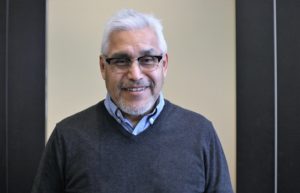Indigenous mindfulness used for healing

By Laura Barrios
CHIPPEWAS OF THE THAMES FIRST NATION—Anishinabek Nation Family Well-Being workers attended a winter training session, with a key focus on mindfulness.
As part of the training held in Chippewas of the Thames First Nation on February 12 to 13, participants heard from keynote speaker Dr. Michael Yellow Bird, a professor of Sociology, and director of Indigenous Tribal Studies at North Dakota State University. Yellow Bird delivered a thought-provoking presentation on neurodecolonization and decolonizing practices, which involves combining mindfulness approaches with traditional and contemporary contemplative practices to re-sculpt neuronal pathways of negative patterns of thought, emotion, and behaviour with healthy, productive ones.
“Our mind is one of the most powerful allies that we have,” stated Yellow Bird. “You can’t be healthy in one place and unhealthy in others – it’s not the way the body works. Research shows us that if we eat well, it can protect us from trauma. We don’t give ourselves what we need to overcome that trauma. Our ancestors did – they walked and moved a lot. What we’ve learned about social work has come from a western way. What I’m giving you is a western way plus Indigenous way.”
Yellow Bird also delved into the Mismatch Theory, whereby modern human beings often find their naturally evolved selves (their fundamental human natures) mismatched or at odds with the current physical, social, and cultural environment. This theory, as explored by Yellow Bird, is applicable to colonialism and its effects on Indigenous Peoples.
“We can decolonize our brain by going into traditional practices and stripping away the harmful and invasive thoughts, practices, beliefs, values, and traditions,” explained Yellow Bird. “We were raised in an environment where we had cultural things that kept us healthy as Indigenous people – thinking, eating – we’re mismatched with the society today. With all of the suicide, anxiety, chronic diseases – wherever colonization has been, you can find these different kinds of disorders.”
Yellow Bird segued into mindfulness and how it can heal emotions, reset genetic expression, noting that running, sleeping, laughing, meditation, diaphragmatic breathing are effective approaches to achieving mindfulness. He conducted a full body scan where he asked participants to close their eyes and start breathing and to focus on that breath – to create and maintain a sense of relaxation.
“When thoughts come into your brain, they’re just thoughts – they aren’t real. Now we’re going to scan the body to see what it’s doing. Start scanning from your feet, to your heel, to instep of your toes— is there any pain? Then I want you to move your attention up to your ankles,” said Yellow Bird, in a calm, soothing voice as he continued the scan until he reached the brain. “Look at how well and healthy it is – your whole body has been scanned. Keep focusing on your breathing. Notice the health and the wellness in your body. Awareness. What you’re tuned into is your feelings, emotions – connection to your body. Five, four, three, two, and one. Slowly open your eyes. Just remember that you’re enlightened knowing the answers, the questions. I’d like you to turn to a person next to you, and talk about what that experience was like. Difficult? Easy?”
Following the scan, a participant explained that she felt more relaxed and focussed after the activity; others agreed. Yellow Bird noted that there’s a chemical reaction – a lift – when you give yourself a moment to relax.
“Disrupting your chain of thoughts and stopping them to stay in one place at one moment – whether you’re singing, beading – so long as you know what you’re doing in that moment, that’s mindfulness,” explained Yellow Bird. “As long as it’s focussed. The longer we do it, the more good stuff happens in our brain. The more it grows. The more we are protected against stress and traumas.”
Mindfulness is a tool that Family Well-Being workers can use as they carry out their work in their respective First Nations, and share with their clients to practice.


